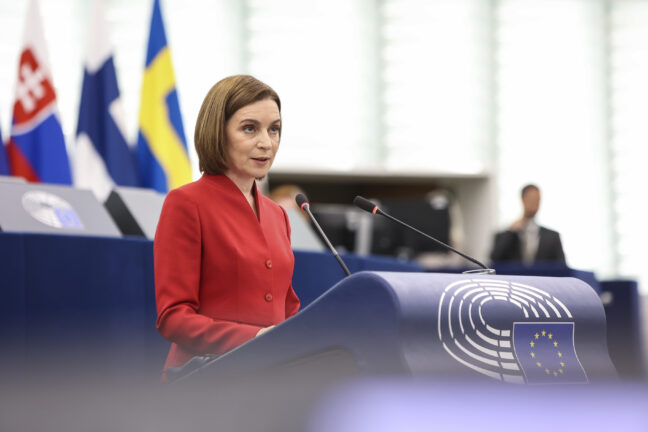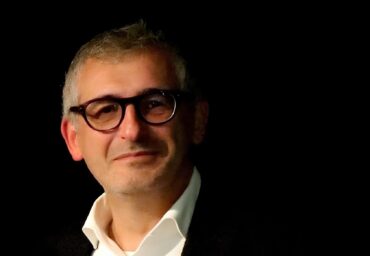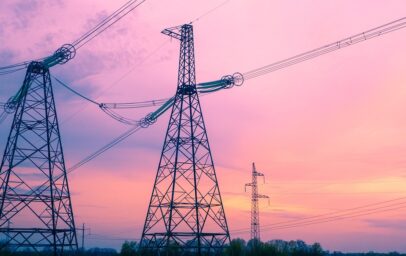Western supporters of Moldova’s pro-European governing party of President Maia Sandu celebrated the election victory on Monday. In equal measure, they relished Russian President Vladimir Putin’s failure to sway Moldovan public opinion.
The failed Russian bid to influence the result of Moldova’s weekend parliamentary election inspired much joy, as well as downright Schadenfreude among Mr Putin’s western opponents. “This woman just kicked Putin’s ass. Congrats!“ tweeted Ron Nehring a prominent US Republican, director of international training at the Leadership Institute, in reference to He was, of course, referring to Ms Sandu.
This woman just kicked Putin’s ass.
— Ron Nehring (@RonNehring) September 29, 2025
Congrats @sandumaiamd #Moldova pic.twitter.com/kkbP07Tl0A
That particular action involving the said feature of the Kremlin leader‘s anatomy has lately gained traction among political figures, usually more restrained. US President Donald Trump’s special envoy to Ukraine Keith Kellog mentioned it in early September; US Senator Lindsey Graham put the figure of speech to good use in July; and in 2022, the European Parliament heard the vivid metaphor from then-MEP Viola von Cramon (Greens/DEU).
Subversion did not work
Official sources could not corroborate the suspicion, but Mr Nehring appears to have expressed the feelings of many an opponent of the Russian strongman with uncanny precision. While their language usually remained within the subtler confines of global diplomacy, the sentiment appeared to encapsulate the outspoken glee of the blunt US Republican’s statement.
Ukrainian President Volodymyr Zelenskyy called Ms Sandu to congratulate her. “These elections showed that Russia’s destabilizing activity loses, while Moldova in Europe wins. Russian subversion, constant disinformation; none of this worked. It is important that Moldova was effective in defending itself against threats together with all who helped,” Mr Zelenskyy said.
Other European leaders sounded a similar note. “We commend the Moldovan society and authorities for the peaceful conduct of the election, despite unprecedented interference by Russia, including with vote-buying schemes and disinformation,” German Chancellor Friedrich Merz, French President Emmanuel Macron, and Polish Prime Minister Donald Tusk said in a jointly released statement.
You might be interested
Effusive praise
“Moldova, you’ve done it again. No attempt to sow fear or division could break your resolve,” tweeted European Commission President Ursula von der Leyen on X. The Union’s top diplomat Kaja Kallas said that Moldova’s vote is a “clear yes to a European future. Despite Russia’s massive efforts to spread disinformation and buy votes, no force can stop a people committed to freedom,” Ms Kallas said.
🇲🇩 Moldova, you’ve done it again.
— Ursula von der Leyen (@vonderleyen) September 29, 2025
⁰No attempt to sow fear or division could break your resolve.
You made your choice clear:
⁰Europe. Democracy. Freedom.
Our door is open. And we will stand with you every step of the way.⁰
The future is yours.
Polish Prime Minister Donald Tusk mentioned that the election was a good lesson. “It took real courage of the Moldovan nation and Maia Sandu personally to win this election. Not only did you save democracy and kept the European course, but you have also stopped Russia in its attempts to take control over the whole region. A good lesson for us all,” the former president of The Council of the European Union said.
Czech Prime Minister Petr Fiala tried to spin Ms Sandu’s triumph into a measure of hope for himself. His cabinet appears on the verge of losing power as the country faces a parliamentary election this week. “Great news from Moldova! … Voters in Moldova gave a clear stop to the pro-Russian parties. This is hope also for Czechia; please come to the polls and don’t let the country fall to Russian collaborators,” Mr Fiala said.
Tenacity prevailed (for now)
Other observers struck a more cautious note. “Yesterday’s parliamentary elections in Moldova demonstrated a high level of commitment to democracy amid unprecedented hybrid threats coming from Russia,” said Paula Cardoso, who led a team on OSCE observers. “From illicit financing funnelled through shadowy networks to relentless disinformation campaigns eroding public trust, and brazen cybersecurity incidents designed to sow chaos, these tactics sought to manipulate Moldova’s democracy and sovereignty. Yet, the nation’s democratic tenacity prevailed and helped to ensure the integrity of the vote.“
Clara Volintiru, the head of the Bucharest office of the German Marshall Fund, said it was clear that electoral mobilisation in favour of the pro-Moscow Patriotic bloc had not been massive. But that did not mean Russia’s “tactics of manipulation and interference” had failed, The Guardian quoted her as saying.
“The goal of the Russian interference is to amplify societal distrust, to diminish the confidence that the Moldovan public has not just in its government and president, but also in its European future,” Ms Volintiru said.
Sour Russians
The response from Moscow was, as was to be expected, less enthusiastic. Kremlin spokesman Dmitry Peskov said Moldovans living in Russia (totaling some 200,000) were unable to vote because there were not enough polling stations. “Assessments should be made later – after we understand how the political forces themselves have defined their position,” Mr Peskov said.
Alexander Gusev, a pro-Kremlin political scientist at the Russian Academy of Sciences, seemed particularly peeved. “The Moldovan authorities, and Sandu personally, are doing everything to ensure that these elections effectively confirm her legitimacy and the course toward European integration,” he told reporters. “For them there is no such thing as justice, they have a simple task and they carry it out like puppets of Europe,” he was quoted by Bloomberg.
While the result handed a victory to Ms Sandu, the European Union, and its allies, challenges linger. The election reveals the polarisation of Europe’s borderlands, where ideological divides are amplified by Russian interference, negative campaigning, and asymmetric information. The outcome depends on Moscow’s strategy of “managed disorder” and Moldova’s fragmented political landscape.
The big picture
Russia’s interest in Moldova is rooted in imperial geopolitics. The annexation of Bessarabia in 1812 positioned the region as a gateway between the Black Sea steppe and the Balkans. During the Soviet era, Moldova became a forward base on NATO’s southeastern flank. Post-1991, Moscow shifted to subtler influence: backing Transnistria’s separatists (where 500 Russian “peacekeepers” remain), controlling energy supplies, and cultivating pro-Kremlin parties, media, and Orthodox networks.
When Moldova pursued EU ties—liberalising visas and negotiating a free-trade agreement—Russia retaliated. Moscow would impose trade restrictions on food and wine, run disinformation campaigns, and conduct cyberattacks.
The Moldovan authorities, and Sandu personally, are doing everything to ensure that these elections effectively confirm her legitimacy and the course toward European integration. — Dmitry Peskov, Kremlin spokesman
The Ukraine war intensified these pressures. Moldova suffered collateral damage from strikes near Odesa and disruptions to energy and transport routes. Ukrainian ports like Reni and Izmail, vital for exports via Romania’s Sulina Canal, became lifelines amid Black Sea instability.
Institutional battles
Authorities barred multiple pro-Russian candidates ahead of the vote, citing illicit foreign financing or ties to banned groups like the Shor Party. The Central Electoral Commission struck several formations from the ballot at the 11th hour. Security services raided vote-buying networks days before polling.
Critics, including OSCE observers, called the rules “onerous” and politically weaponised. A 2022 electoral code revision required candidates to disclose foreign-linked funding retrospectively—a provision opponents claim targeted pro-Russia factions. Litigation surged, with courts dismissing over 200 appeals.
Moldova, you’ve done it again. — Ursula von der Leyen, President of the European Commission
The electorate fractured between urban pro-EU voters and rural constituencies swayed by Kremlin narratives. Remittances, which constitute 15 per cent of GDP, reflect this divide: 70–80 per cent of transfers are in euros, not rubles. Yet EU inflation (6.2 per cent in 2024) has eroded migrant workers’ savings, fuelling disillusion with Brussels.
Ethnic, religious divides
Ethnic minorities—Ukrainians (6.6%), Russians (4.1%), Gagauz (4.6%), Bulgarians (1.9%)—form swing blocs. In Gagauzia, a Turkic-speaking autonomous region, 98 per cent backed a Russia-led customs union in a 2014 referendum. Its governor, Evghenia Guțul, elected in 2023 with Shor Party support, was convicted of accepting €52k from Russian sources.
Bulgarian communities in Taraclia, reliant on Russian-language media, lean pro-Moscow but show ambivalence post-Ukraine invasion. Ukrainian refugees, now three per cent of Moldova’s population, largely back Ms Sandu’s pro-Kyiv stance but face integration challenges.
Orthodox Church rivalries deepen divisions. The Moscow-linked Metropolis, controlling 70 per cent of parishes, circulates anti-EU sermons and hosts Russian-funded priestly delegations. Reuters documented clergy touring Russian monasteries while promoting “traditional values” over “degenerate” Brussels. The rival Romanian-aligned Metropolis of Bessarabia counters with civic duty appeals, framing corruption as a moral failing.
Consequences of polarisation
A pro-EU victory complicates Kremlin influence but guarantees little. EU accession demands judicial reforms and anti-corruption progress—areas where Moldova ranks 76th globally, as per Transparency International. Brussels may delay membership talks until 2027, testing voter patience.
Russian subversion, constant disinformation; none of this worked. — Volodymyr Zelenskyy, President of Ukraine
Russia, meanwhile, will exploit Transnistria’s frozen conflict. The breakaway region hosts 1,500 Russian troops and Soviet-era arms depots. Kremlin proxies could escalate “peaceful instability”: protests over energy bills or controversial court rulings, paralyzing governance.
Gas remains a pressure point. After Russia cut supplies in 2022, Moldova relied on spot-market purchases, doubling household prices. Pro-EU parties promised subsidies but face fiscal constraints. Workers in Italy and Germany, who sent home €1.2bn in 2023, now contribute 15 per cent less due to EU inflation, which is putting extra strain on household budgets.
Strategic stalemate
Moscow’s strategy prioritises low-cost disruption. Hybrid tactics—cyberattacks on state servers, disinformation about “Romanian annexation”—aim to delegitimise pro-EU elites. Meanwhile, Transnistria’s leadership went into the election with renewed threats of secession bids, should Ms Sandu retain power.
Russia will escalate hybrid warfare, testing NATO’s Black Sea resolve. — analysis by Geopolitical Futures
Ethnic and religious fault lines will persist. Gagauzia’s governor vows to “defend Russian interests” via autonomy statutes, while Bulgarian mayors demand dual-language education to counter “Ukrainisation.” The Orthodox Church’s Moscow wing, bolstered by Russian-funded renovations to 50 monasteries, remains a potent ideological tool.
The election entrenches Moldova as a battleground for influence. Pro-Europe forces must deliver visible EU benefits—accelerated visa-free travel or infrastructure funds—to retain urban support. Rural voters, however, remain vulnerable to Kremlin narratives of Western neglect.
Testing NATO
“Russia will escalate hybrid warfare, testing NATO’s Black Sea resolve,“ wrote server Geopolitical Futures. „For Brussels, Moldova is a litmus test: can the EU stabilise neighbours without membership carrots? Failure risks a cycle of protests, reform stalls, and democratic backsliding.“
Moldova’s fate hinges on balancing external pressures with internal cohesion. As compromises between the factions are unlikely, its fractured future will probably mirror Europe’s broader struggles.











